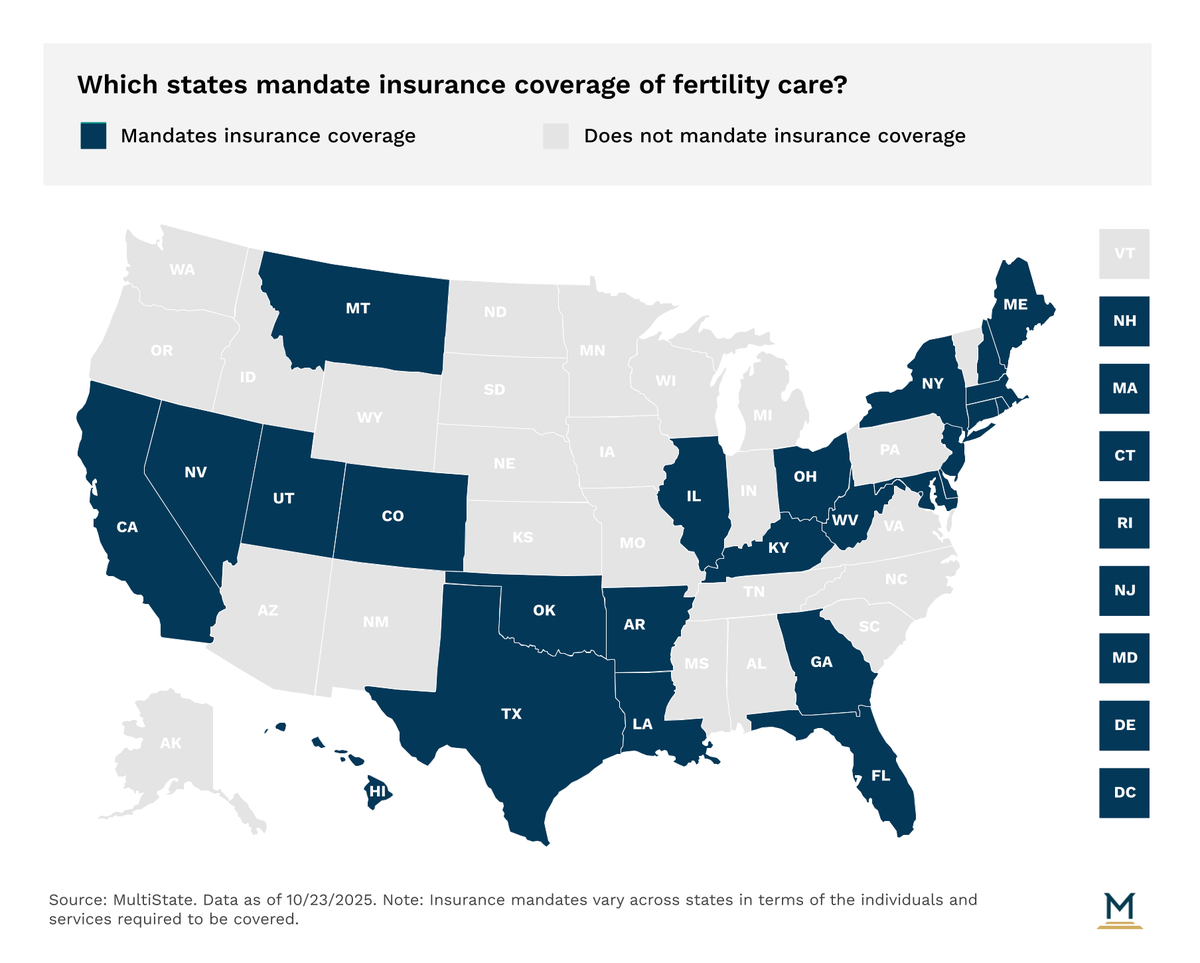
Health Care & Wellness
Alcohol Legislation Takes A New Turn: Canned Cocktails, Direct-to-Consumer Shipping, and More
February 12, 2026 | Kerrie Zabala
November 5, 2025 | Mary Kate Barnauskas

Key Takeaways:
In October, President Trump announced that a common fertility drug will be offered at a negotiated lower price through TrumpRx and that federal officials are creating a new pathway for employers to offer fertility benefit packages. The announcement builds on a campaign commitment to make in vitro fertilization (IVF) more affordable and follows an executive order directing officials to recommend policies to protect IVF access and reduce costs for IVF treatment.
Federal action comes amid sustained state-level activity on fertility treatment. For years, states have considered insurance and Medicaid coverage requirements for fertility preservation and treatments, including IVF. Currently, 25 states and Washington, D.C. require insurance coverage for fertility care, although mandates vary in terms of who and what they cover. In addition, debate over IVF sparked in February 2024 following an Alabama Supreme Court decision that found that the state’s Wrongful Death of Minor Act applies to all unborn children, including embryos outside the womb. The ruling prompted discourse over the legal status of embryos and implications for IVF. Alabama lawmakers quickly responded by enacting a law to provide liability protections for IVF providers, and other states have considered additional measures to protect access.

In 2025, several states advanced legislation on insurance coverage for fertility care. Notably, in California, implementation of a 2024 law requiring large group plans to cover infertility diagnosis and treatment, including IVF, and mandating small group plans to offer certain fertility-related coverage, was delayed to January 1, 2026, through AB 116.
The California Department of Managed Health Care also submitted a benchmark plan update to the Centers for Medicare & Medicaid Services (CMS) to include infertility treatments and IVF as essential health benefits, which, if approved, would take effect January 1, 2027. Similarly, Virginia passed legislation directing the Health Insurance Reform Commission to review the inclusion of fertility diagnosis, treatment, and preservation services in the state’s essential health benefits benchmark plan during its 2025 review. In October, the Commission discussed such changes to the benchmark plan and directed staff to draft a bill to incorporate fertility preservation and treatment, including three cycles of IVF, into a new benchmark plan.
Other states, including Florida, Georgia, New York, and Nevada, focused on fertility care for individuals undergoing medical treatments that risk infertility. Nevada also passed another measure that would have mandated broader insurance and Medicaid coverage for infertility treatment and preservation. However, the bill was vetoed by Governor Joe Lombardo (R), who cited fiscal concerns with an unfunded Medicaid mandate.
Several states considered legislation in 2025 aimed at protecting or clarifying access to fertility care and IVF. Tennessee SB 449 and Colorado HB 1259 affirmed the right to pursue fertility care. Colorado’s law specifically addressed the use, destruction, and donation of gametes and embryos, while prohibiting actions against fertility providers and updating requirements for fertility-related entities. Similarly, Georgia HB 428 clarified that nothing in state law prohibits or prevents an individual from obtaining IVF, while Nevada AB 176 prohibits governmental interference in contraception and family planning services, including IVF. However, Nevada Governor Joe Lombardo (R) vetoed SB 217, which would have established specific rights for assisted reproduction.
In addition, Louisiana modernized and reorganized the state’s IVF statutes with SB 156, which redefined terms, outlined practitioner criteria, clarified embryo donation procedures, reinforced IVF agreements in disputes, and expanded legal protections for providers.
Restorative reproductive medicine is an emerging issue within fertility care policy, though the concept has drawn criticism from fertility providers and patient advocacy groups. Arkansas became the first state to enact restorative reproductive medicine legislation with the RESTORE Act, which defines the practice as a “scientific approach to reproductive medicine that seeks to cooperate with or restore the normal physiology and anatomy of the human reproductive system without the use of methods that are suppressive, circumventive, or destructive to natural human functions.” The RESTORE Act includes provisions that:
Amend IVF insurance requirements to also require coverage of restorative reproductive medicine.
Additionally, the Louisiana House passed a resolution (HR 311) recognizing restorative reproductive medicine. The resolution requests the State Board of Medical Examiners and the Department of Health to assess information regarding restorative reproductive treatments and health practices and develop a report on their findings.
StateVitals is the leading resource on how state governments are shaping healthcare policy and transforming care and delivery, brought to you by MultiState’s Health Care Policy Practice. MultiState’s policy and advocacy professionals are uniquely positioned to give you and your organization the big-picture view on state health policy reform, plus the latest trends on how policymakers are thinking about healthcare and similar emerging issues. Learn more about StateVitals, or schedule a demo here.

February 12, 2026 | Kerrie Zabala

February 5, 2026 | Geoff Hawkins

January 27, 2026 | Lisa Kimbrough